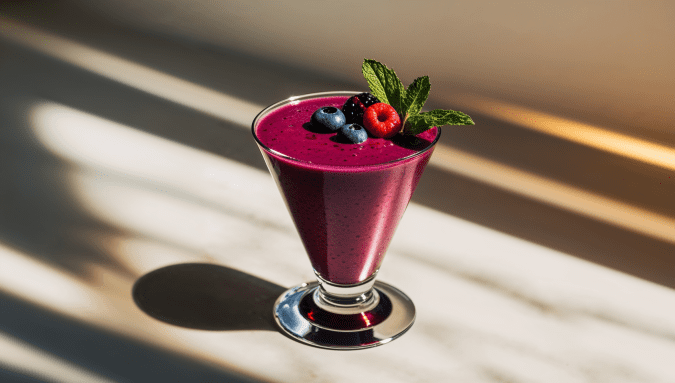This refreshing Vegan Keto Berry Smoothie is perfect for a quick breakfast or snack, combining low-carb ingredients with delicious berries. Here’s how to make it:
Ingredients
- ½ cup coconut milk (or unsweetened almond milk)
- 1.5 cups unsweetened almond milk
- ⅔ cup frozen raspberries
- ⅔ cup strawberries (fresh or frozen)
- ½ cup blackberries (fresh or frozen)
- Optional Add-ins:
- 1 tablespoon sugar-free whipped cream
- Low-carb sweetener (like stevia or erythritol)
- 1 scoop vegan protein powder
- 1 tablespoon MCT oil
- 1 tablespoon coconut cream (melted)
Instructions
- Combine Ingredients: In a high-speed blender, add the coconut milk, almond milk, frozen raspberries, strawberries, and blackberries. If using, add the optional ingredients like protein powder or MCT oil.
- Blend: Blend on high until smooth and creamy. If the smoothie is too thick, add more almond or coconut milk; if it’s too thin, add ice or a bit of xanthan gum to thicken.
- Serve: Pour into glasses and top with optional sugar-free whipped cream or additional berries if desired.
Nutrition Information (per serving)
- Calories: Approximately 116 kcal
- Carbohydrates: 9 g
- Net Carbs: About 6 g
- Protein: 1 g
- Fat: 8 g
Low-Carb Fruits for Keto Smoothies
When looking to add low-carb fruits to your keto smoothie, consider the following options:
- Raspberries: Approximately 5 net carbs per cup.
- Blackberries: About 6 net carbs per cup.
- Strawberries: Roughly 7 net carbs per cup.
- Blueberries: Higher in carbs but can be used in moderation, with about 12 net carbs per cup.
- Avocado: Technically a fruit, it’s very low in carbs and high in healthy fats.
These fruits not only enhance the flavor of your smoothies but also provide essential nutrients without significantly increasing your carb intake.
Substituting Coconut Milk
Coconut milk can be substituted with other non-dairy milks suitable for a keto diet. Options include:
- Almond Milk: Unsweetened almond milk is low in carbs and a popular choice.
- Cashew Milk: Also low in carbohydrates and creamy.
- Hemp Milk: Another good alternative with a slightly nutty flavor.
Ensure that any non-dairy milk you choose is unsweetened to keep the carb count low.
Effects of MCT Oil on Taste
Adding MCT oil to your smoothie typically has a neutral flavor, meaning it won’t significantly alter the taste of the smoothie. However, it can add a slight creaminess and enhance the overall texture. MCT oil is primarily used for its health benefits, including providing quick energy and supporting ketosis.
Keto-Friendly Sweeteners
Several keto-friendly sweeteners do not affect blood sugar levels, making them ideal for sweetening smoothies:
- Stevia: A natural sweetener derived from the stevia plant; it has no calories and does not impact blood sugar.
- Monk Fruit Sweetener: Another zero-calorie option that doesn’t affect blood sugar levels.
- Allulose: A rare sugar that has minimal impact on blood glucose and insulin levels.
These sweeteners can be used to enhance the sweetness of your smoothies without compromising your keto diet.
Benefits of Adding Collagen Powder
Incorporating collagen powder into your keto smoothie offers several benefits:
- Supports Skin Health: Collagen may improve skin elasticity and hydration.
- Joint Health: It can help reduce joint pain and improve mobility.
- Protein Source: Collagen provides additional protein without adding significant carbs, making it ideal for a keto diet.
Adding collagen powder can enhance the nutritional profile of your smoothie while promoting overall health.
This smoothie is not only low in carbs but also rich in antioxidants from the berries, making it a nutritious choice for anyone following a vegan keto diet. Enjoy this delightful blend as part of your healthy lifestyle!












